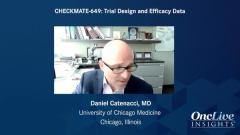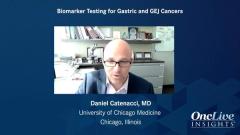
Recent FDA Approvals in Gastric and GEJ Cancers
Daniel Catenacci, MD, and Sam Klempner, MD, consider the overall impact of recently approved immunotherapy-based regimens for gastric and gastroesophageal junction cancers.
Episodes in this series

Daniel Catenacci, MD: How will the standard of care change for the treatment of these patients with newly diagnosed gastric cancer now that immunotherapy [I-O] is on the map? And with several studies that we have, we can talk about the most recent approvals with nivolumab and chemotherapy for first-line adenocarcinomas and also pembrolizumab and trastuzumab with chemotherapy for HER2-positive gastroesophageal adenocarcinoma. What are the practical implications of these FDA approvals?
Sam Klempner, MD: It’s a big topic and a good question. To take a step back, one of the lessons is to understand the biology of our patients. We owe it to the people to understand the tumor as much as we can, whether that’s PD-L1, HER2, MSI [microsatellite instability], and more comprehensive genomic profiling we’ll discuss. But the standard will change, and the label for nivolumab that was approved in April of this year is quite broad. Essentially any patient with first-line adenocarcinoma who walks into your office is technically a candidate, per the label. We’ll get into some of the nuances of CheckMate649 and whether we feel like that is necessarily the best option for patients who may be CPS [combined positive score] negative or low. But it will change the standard, and there’s going to be a significant uptake in the use of chemotherapy and I-O, particularly in the higher CPS population, where the magnitude of benefit is clear. In the middle and low population is where a lot of the nuances are and where patients and providers may benefit from taking a deep dive into some educational learning around the design of CheckMate649, particularly some of the subsets. I do think that the standard will change. Most of our patients will be receiving 5-FU [fluorouracil], platinum, and nivolumab, although there are, in my opinion, patients for whom this is probably not the preferred approach.
Daniel Catenacci, MD: I would totally echo that, and we’ll get into that when we go into the details of the study. But at a higher level, we should probably also bring in the approval of pembrolizumab, based on KEYNOTE-590, at least in the adenocarcinoma G [gastroesophageal] junction and esophagus, where there’s some overlap in approval there, and how one’s going to decide on which therapy to use because they’re both technically eligible. You mentioned that maybe PD-L1 is going to help us decide whether to use I-O. But then, what’s going to tell us which of those 2 agents to use? Do you have a preference?
Sam Klempner, MD: Yes, I think with PD-1 and PD-L1, I do have some preference. There is the bulk of data from KEYNOTE-590 and ATTRACTION and CheckMate, and the other KEYNOTE-062, is all with anti–PD-1 agents. Therapeutically in my own mind, I conceptually think of pembrolizumab and nivolumab as essentially therapeutically interchangeable. Some of it is driven by data in terms of the regimen in combination that was used in the trial and the label, and some of it is driven honestly by convenience and chemotherapy backbone.
TRANSCRIPT EDITED FOR CLARITY













































